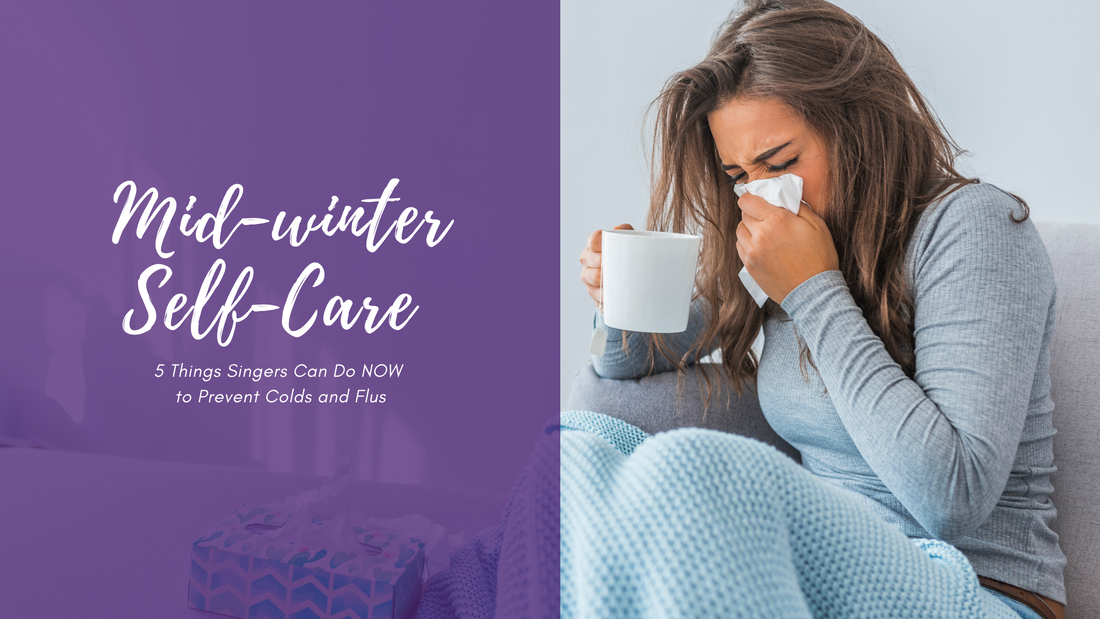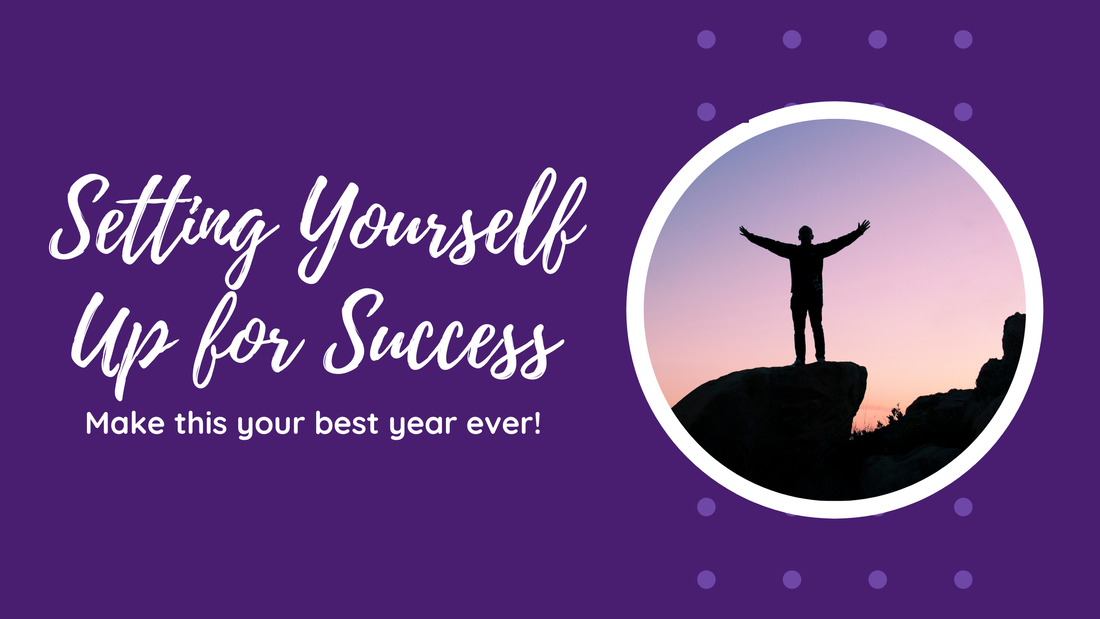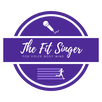|
Before I get on to the main subject of this post I want to share a story about my son, Misha. His plight over that last year mirrors what many singers have been going through. As an elite fencer on the Canadian team, he was on track to qualify for the Olympics only to have everything cancelled last March.. No travel, no tournaments, even limited ability for training (unfortunately, you can't fence online, unlike singing, which has blossomed online). But now the buzz is that qualifying will be happening by April, so Misha is setting off on his first trip in 10 months to train in Vancouver and then will be heading out to Montreal to be with the National Team. Exciting, but also so worrying these days. Now that we find ourselves in the middle of January we are at that time of year, when we just want things to be over. We certainly want COVID-19 to be over, we want the travesty of the U.S. election to be over, and we want winter to be over. Mid-winter has a number of challenges for the singer. Less sunlight, cold temperatures and dry air from heating (or if you're in the prairies you get the dry cold). This can spell trouble for the voice from dried out vocal folds to greater risk of an upper respiratory tract infection A frequently asked question by some of my students is “How do I keep from getting sick?” That is an excellent question that every singer needs to ask, this year more than ever, since COVID-19 can hit the respiratory system hard. Wearing masks, staying in seclusion and handwashing is certainly one way to avoid respiratory infections. Though necessary during these pandemic times, these are actually not the only course of action we should be taking. Even before the pandemic we were living in an overly sanitized world and this has actually had a negative influence on our immune systems. I used to be one that frequently got ill, if not before or during a performance than definitely after. This had a lot to do with stress and the levels of stress hormones in my system. Even when I wasn’t performing I would get frequently ill. That all changed when I increased my fitness level and optimized my nutrition. These “discoveries” are what has prompted me to become a personal trainer. nutrition and stress resiliency coach. I love sharing my knowledge and experience with not just my students, but with other singers. So here are my top tips for preventing illness. Now getting fit and cleaning up your nutrition are journeys that will take time and will be individual, but here are 5 things you can do now to help reduce the risk of infection. 1. Make time to de-stressStress is a big part of getting ill. Our adrenal systems are in overdrive, but can only do it for so long before giving out. When they do you will be hit hard. Whether it’s making time to meditate, eating mindfully, taking a hot bath, reading a good book or just vegging out in front of the TV; commit to at least an hour a day in some activity that will calm you where you allow yourself to not think about any of the myriad things you need to do. 2. ExerciseDo a physical activity for at least 30 minutes every day. If you are a beginner, this might start out as walk. As you progress, keep challenging yourself and trying different activities. Keep your body guessing! Even though you may be fitter than you were before, if you keep doing the same thing your body adapts and will plateau not just with physical results, but with immunity as well. 3. Make a green smoothie every dayThis was a game-changer for me. Just throwing a handful of spinach or kale can make a huge difference. You are getting a burst of nutrients in an easily absorbable form. Fruits are full of vitamins such as C, A and some B vitamins, and the greens that are full of minerals such as iron, magnesium, manganese, copper, calcium, and vitamins A, C, B6, and folate (exact nutrients will vary with choice of fruits and greens). Both also contain other phytonutrients and of course, fiber (over 90% of Americans fall short of meeting their daily fiber intake.) Whole foods are always preferable to supplements. 4. Humidify and hydrateKeeping your vocal folds and the rest of your respiratory tract well hydrated from the inside out will help maintain a protective mucosal layer to prevent the entry of viral or bacteria pathogens. Central heating may keep you toasty warm, but it dries out the air which can suck the moisture right out making you more susceptible to infection. Make sure you're indoor spaces are at about 50% humidity by running a humidifier or use a personal nebulizer with an isotonic saline solution. Humidifying will take care of the upper surface of your vocal folds, but you what to also be hydrated deeper to help flush out toxins. The cold and dry may require that you increase your daily water intake. 5. Get plenty of sleepThis is the time of rest and restoration of the body. It allows for the brain to drain toxic build up and the rest of your body is healing and repairing, the toxic by-products of stress can also be removed from your system. The average adult requires 7 – 9 hours or sleep.
Here’s a BONUS tip. If you find you are very stressed and need a little extra help, an adaptogen supplement may be helpful. Adaptogens are a unique group of herbs used to improve the health of your adrenal system. By tonifying and rejuvenating the entire adrenal system, adaptogens promote the healthy regulation of cortisol the “stress hormone”. This special class of herbs improves strength, energy, stamina, endurance and mental clarity. Here is a list of a few adaptogens: Maca root, astragalus root, ashwagandha root, maitake mushroom, cordyceps, reishi mushrooms, holy basil, shisandra and ginkgo. If you feel you need some help de-stressing or boosting your immune system then I would love to help. You can contact me to book an Introductory Health Coaching session. Just email me at [email protected] for more information.
1 Comment
The past year has packed a wallop. So many things happened, so many goals and dreams set aside. 2021 is starting as a year of hope with new vaccines already starting to make the rounds.
Things won’t be back to normal for a while yet, but it doesn’t mean you shouldn’t dream, make some goals, plan them out and start acting on them. Do you make new year's resolutions? I’m not a big fan of New Year’s resolutions myself. When I feel my life is in need of a change I start then and there. Lots of my long term goals and dreams didn’t start in January. There are always new things about myself I would like to work on - MY HEALTH, RELATIONSHIPS, BUSINESS – if I waited for all of it to start January 1 I would have missed opportunities and it would have been far too intimidating to tackle it at all. OUR IDEAS OR NEED FOR CHANGE DON’T SPARK SPONTANEOUSLY ON A GIVEN DATE. That being said there are always cycles in the year that can make it feel like a fresh start - a new week, a new month and yes, a new year. Many people look to the New Year for a fresh start (and despite what I said there is one new habit I would like to develop starting January 1, which I’ll tell you about later). The New Year makes for a fresh new chapter in our lives. Unfortunately, it’s often a fairy tale chapter of all the wonderful things our life will be with the changes we will make. And that fairy tale bubble usually bursts by Valentine’s Day. The most commonly broken resolutions are:
So how can you make your resolutions stick - no matter when you decide you will start? Don’t overdo it. Choose only one to three resolutions to start with. Tackling too many resolutions is certainly going to lead to failure. If being less stressed was one of them you are actually going to set yourself up for more stress. And here the important thing - all three resolutions don’t have to start at the same time! Staggering them out through the year will make it more manageable. Decide on your WHY. Why is it important to change that? Is it simply that it would be nice to do or is there a real need that deeply affects the quality of your life? For example, you want to drink less. Is it because you spend too many Sundays with a hangover or is it because your relationships, your work or your health are on the line because of your drinking? The latter is surely a more compelling WHY, which will more likely make you stick with it. Set realistic goals. If you want to buy a new house, but are racked with debt, now is not the time to start looking. Likewise, don’t expect to lose 50 pounds in two months (by the way, healthy weight loss is 1-2 lbs/week, so 15 lbs in two months is more realistic). Set specific goals. Specific in time frame to complete, specific in quantity, specific in actions to take. Remember these should all be realistic. For example you want to save $2000 for a new sound system by March - it is specific, but is it realistic? Can you save $2000 in three months? Make it more realistic – Save $2000 for that equipment by next December. You have 50 weeks to save! So open a special bank account and put in $40 each week. Make it enjoyable. Want to exercise more? Don’t get lured into the gyms unless you know they have something you would enjoy doing. If you like the idea of lifting weights, fine. But that’s not everyone’s cup of tea. Maybe a group class, but which one? A Zumba class might be more fun. It feels less like exercise and more of a party and that may be the thing you need to keep you moving. Volunteering? Serving at a soup kitchen, though very noble, may not be for you. As a singer, perhaps you can sing at shelters or nursing homes instead. Don’t underestimate the gift of your music - after all Joyce DiDonato singing in prisons. Get an accountability partner. You are more likely to stick with it if you have someone to be accountable to. This could be a friend or family member. It can be someone that will join you in making those changes in their own lives or just someone with whom you’ve shared your goal. You can join an online accountability group, like The Fit Singer Community, where there will be other like minded people with whom you can share your journey. It can be a trainer or wellness coach like me (I work with people online in accountability groups and one on one) or other professionals as required (example – financial planner). Make an appointment with yourself. Write it in your calendar. Exercise time. Meal planning time. Family time. Time for budgeting and going over accounts. If it’s scheduled you are more likely to do it. Reassess frequently. Every month take a look at where you’re at with your goal. Is it moving forward? Do you need to tweak your action plan? Can you make further improvements on this goal? Is it time to start on the next resolution on your list? Remember any resolution you make is making a new habit and it doesn’t happen magically. It will require work and dedication. Sometimes it requires the breaking of old bad habits, which is sometimes the greatest challenge. But it will be so worth it when you come to next New Year and can reflect on what you accomplished in the past 12 months. If you need help with finding more vocal freedom, reducing your stress, tension in the body, vocal fatigue and low energy that may be keeping you from singing with vitality, artistic freedom and confidence then the free The Fit Singer Community would be a great place to start! And what’s my resolution, for one who doesn’t usually make New Year’s resolutions? My resolution is to set aside more time for efficient planning and setting up systems so that I can show up more consistently in my business and personal life. Happy New Year! May this year bring you renewed hope and all the blessings you deserve!!! |
AuthorHi, I'm Elizabeth! I'm your guide on your vocal journey. I work with singers - Voice Students of all ages, Singing Teachers and Choristers - basically anyone who LOVES to Sing and wants to free their voice. Archives
August 2022
Categories
All
|
Elizabeth Rotoff Voice and Wellness
Home to
Member of:
Elizabeth Rotoff Voice and Wellness © COPYRIGHT 2020. ALL RIGHTS RESERVED.



 RSS Feed
RSS Feed





